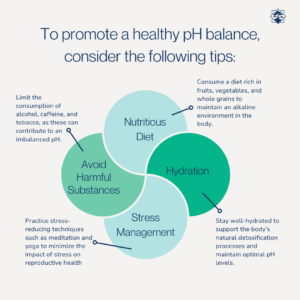The Vital Role of pH Regulation in Ensuring a Healthy Pregnancy
Embarking on the journey to parenthood is an exciting chapter in one’s life. At Viera Fertility Center, we understand the importance of creating an optimal environment for conception and early fetal development. One key factor that often goes overlooked is pH regulation. Maintaining the right pH balance in the body is not only essential for overall health but plays a pivotal role in ensuring a healthy pregnancy.
Understanding pH Balance
Your body’s potential hydrogen (pH or “acid-base balance”) is a measure of the acidity or alkalinity of a substance on a scale from 0 to 14. The human body has different pH levels in various organs and systems, and maintaining the right balance is crucial for optimal function. When it comes to fertility and pregnancy, the pH of reproductive fluids, particularly in the female reproductive tract, plays a vital role.
Optimal Conditions for Conception
The female reproductive tract has its own unique pH environment, which changes throughout the menstrual cycle. During ovulation, the cervical mucus becomes more alkaline, creating a favorable environment for sperm survival and motility. Sperm thrive in a slightly alkaline environment, and an imbalanced pH can hinder their journey towards the egg, affecting the chances of successful conception. When the vaginal pH level is at optimal levels (between seven and 12), sperm can survive as long as 48 hours within the female reproductive system.
What Impacts the Acidity of Cervical and Vaginal Fluids?
Several lifestyle factors can influence pH levels in the body, including diet, stress, taking certain medications as well as living in urban areas where air quality is regularly poor, and using lubricants harmful to sperm. An acidic environment may be linked to inflammation and oxidative stress, which can negatively impact fertility and pregnancy outcomes. At Viera Fertility Center, we emphasize the importance of adopting a balanced and healthy lifestyle to support overall reproductive health.

Conditions Caused by an Acidic pH Level
Most people suffering imbalanced pH levels (0-5) are too acidic. An overly acidic pH forces your body to “borrow” potassium, sodium, calcium, and other minerals from bones and organs to help neutralize acid and eliminate it from the body through sweat and urine.
Mild to moderate acidosis may promote high blood pressure, heart problems, osteoporosis, diabetes, obesity, and kidney stones. Hormone production in both men and women can be affected by mild acidosis since the ovaries and testes are losing minerals due to acidic pH.
A low pH level (alkalosis) is less common than acidosis. Symptoms of alkalosis include nausea, numbness in your fingers, hands, feet, hand tremors, muscle twitching, and muscle spasms.
Treatment for Imbalanced pH Levels
Treatment for an imbalanced pH can involve any of the following:
- Making changes to your diet
- Increasing physical activity
- Drinking more water
- More intensive treatments to improve seriously low or high pH levels
These treatments include raising pH with intravenously administered sodium bicarbonate, taking sodium citrate to improve kidney functioning, and restoring electrolyte imbalance with special fluids.
Are Your pH Levels Interfering with Fertility?
Viera Fertility Clinic provides comprehensive fertility testing for women and men who are having difficulty conceiving. In addition to semen analysis, hormone and ovulation tests, and pelvic ultrasounds, we also perform pH testing of vaginal and cervical fluids. If we find imbalanced pH levels, we typically recommend eating more foods to help reduce acidity (apples, bananas, oranges, tomatoes, yogurt, almonds, sunflower seeds) or possibly taking nutritional supplements to restore a healthy pH balance to the vagina and cervix.
High estrogen-low progesterone levels, a condition called “estrogen dominance”, can also make pH levels toxic to sperm. Women with polycystic ovarian syndrome (PCOS) are at risk of suffering from estrogen dominance and might have difficulty conceiving. At our Melbourne fertility clinic, we test serum hormone levels and provide treatment for women with estrogen dominance or PCOS to help increase their chances of getting pregnant.
Infertility Unrelated to pH Levels
Assisted reproductive technologies such as IVF and IUI are just a few options for women wanting to have a baby but cannot conceive naturally. Our fertility clinic in Melbourne can help you and your partner achieve pregnancy using advanced testing, technologies, and minimally invasive procedures. Contact us today to schedule a consultation appointment.